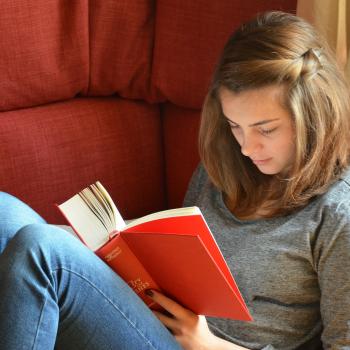Briefly describe your experience being homeschooled, including the amount of interaction you had with other homeschoolers or non-homeschoolers (socialization) and what sorts of textbooks or homeschool program your family used (academics).
Joe:
Not being homeschooled, I have no experience with it at all. But, we churched exclusively with homeschoolers. We never had friends outside of this church and, if we did, were banned from them immediately. Homeschooling was God’s plan for everyone and public school was the evil spawn of Satan’s semi-eternal plan. We socialized with only these homeschoolers and, even though we went to government schools for our whole schooling career, we told everyone we were missionaries there and they believed the lie.
Regarding academics, my mom was very careful in planning our curriculum for each year; she never became overly reliant on one source or publisher. Almost all the materials that she chose were promoting a conservative Christian worldview, such as our history, literature, and science materials from A Beka and Bob Jones. For math, we used Saxon. From my observation, she prepared a much more academic and structured education for us than many other homeschooling families seemed capable of.
In terms of socialization, when I was young, we had regular activities with other local homeschoolers such a weekly park days, monthly roller-skating days, and occasional field trips. We also participated in some community-based activities such as gymnastics. But as I got older, there were fewer homeschooled kids my age, and our participation in outside activities started to decrease.
As I reached my teens, my parents bought into Reb Bradley’s idea that teenage rebellion was a recent American trend due to indulgent parenting and peer pressure. So, for most of my teen years, my main opportunity for social interaction came once a week at church. However, it wasn’t much of an opportunity because I wasn’t allowed to join a youth group at our churches (and later, our homeschooling church Hope Chapel didn’t even allow a youth group to exist). At my high school graduation ceremony, which was attended by hundreds of local homeschooling families, I had only briefly met one of the other 12 graduates before.
I was involved in a number of homeschool groups, though which varied by year. We had a circle of other like-minded homeschool families that we associated with regularly, and that, combined with at least one homeschool co-op a year and also a weekly Bible club, is where we got the majority of our socialization. This meant that literally all of my socialization took place with people who shared my parents’ beliefs, and I was never exposed to people who believed anything different.
As for academics, my mother used a hybrid approach with us, choosing different textbooks for each subject. We did apologia for science, for instance. Our history and science curricula were religious while our math and grammar curricula were not.
From K-8, mom was pretty good at making sure to work with us one-on-one. Especially early on, there were a lot of hands-on activities, and the education I received during my elementary school years was really pretty top-notch. This hands-on and one-on-one approach began to change during the last couple years of this period as we worked more independently, but even then mom made sure to at least supervise our work. Once we reached high school, we studied on our own full time. Mom would give us the textbooks to complete at the beginning of the year, and then we’d give them back at the end of the year. For a few subjects, like languages, we sometimes (though not always) had tutors.
Lisa:
I hated school more than anything. I mean, when I was really small and the others weren’t old enough for school yet (many of them weren’t born yet!), it was nice that my mom would spend so much time with me and it was fun, I enjoyed learning something. But the older I got and the more kids my Mom had to tutor, the less fun I had. My Mom had little time for each individual kid and at some point, I guess it was when I was 12, 13, I felt like it wasn’t so important what I had to study, it was more important to help the smaller ones do their studies. My Mom had some tougher pregnancies as well, which put her out of the picture for weeks and months. Those were the times where I was the one responsible for teaching the others. I basically didn’t do much myself since I also had the house to manage and the smaller kids to look after. It was horrible, trying to keep the toddlers satisfied while cleaning and cooking and at the same time looking after the boys who were just screaming and not concentrating.
At one point, once I turned 14, scientific studies lost their importance. My Dad felt it would do no good to teach a girl too much science. So the kitchen became my classroom and, even though I could already manage a house better than most 20 year olds, my Mom made me her fellow “help-meet.” I tried to get in some more math and that, but I didn’t get far. When I was 16 I realized that I wasn’t going to get any sort of degree anyway. My Dad didn’t want me to take SATs – not that I would’ve passed them anyway – and so I settled on studying the “important” things with some other women we knew – sewing, flower arranging. I also read a lot of the P/QF books that were coming out – the Ludy books, Harris, Pride, Pearl and so on. My Dad was torn. At some point, he wanted us to be smarter than kids from public schools and I think that somewhere he hoped I would have finished high school earlier than most people do, but then again, he took pride in the fact that his daughters were so “biblical.” I never quite understood what he wanted us to do.
We didn’t have much contact with other homeschoolers. We went to conventions where we met mostly other Christian homeschoolers, but never many who lived close enough to actually have vivid contact with them. Having friends wasn’t as important anyway, your siblings were supposed to be your best friends.
Since my mother was such a great fan of Mary Pride, Pride’s books on homeschooling were her major resource on how to structure the classes as well as which textbooks to use. We tried out different curricula and different systems, but online-learning wasn’t our major way of studying. I guess we were just too many kids and had too little money to buy the technical necessities for that.
My dad once said with some disdain that homeschoolers who participated in homeschool co-ops and group classes were “faux-schoolers.” However, we did have some small group classes for extracurriculars and I took French and art from local women who taught classes in their homes. Our family friends were almost always other Christian homeschoolers, and we were fairly well-socialized [albeit primarily within that demographic]. When we took ballet or gymnastics or martial arts, we made friends with the other kids and didn’t seem to have any socialization issues beyond general pop culture ignorance.
Early on we had a consistent schedule each day, I usually did handwriting reading and math, I remember enjoying different school projects we tried. When I was aged 7-9 we periodically attended a homeschool co-op where we participated in an arts and music program, we were also part of a conservative homeschoool girls club called “Keepers at Home” which I enjoyed. As there were more and more children involved, things got less consistent. The older kids were expected to cover much of their work on there own in independent study. We did not have much interaction outside the home when I was in my teens. I don’t remember having a consistent curriculum. My mom tried many different ones, and sometimes we would start and stop different programs in one year.
My parents used a very eclectic curriculum. They used different systems for different subjects. One year, my mom tried out a series that covered all the main subjects in one massive book. That year we read a lot and made fun science projects. I learned a lot that year. But the more kids my mom had, the less involved she became in our school work. By the time I was 11, I was completely responsible for my own education. I would create my own schedules and do my very best to stick to it. Every week or so I would update my mom on how I was doing. It is very hard to be self-motivated when you are so young. Especially while being required to do so much house work. I never really completed any of my goals, and was constantly lagging behind. During my second year of high school we joined a homeschool co-op at our church that met once a week. I probably accomplished more academically in the two years we were involved with co-op than at any other time.
My mother tried out a lot of different curricula with me. We started out using Bob Jones, Abeka, Rod and Staff, and others I can’t remember. I hated all of them. They were boring and their religious message was painfully overt. Eventually we settled on Sonlight, which both of us liked for academic content and for the creativity of their approach. I generally did my school work in the morning, finished up at noon and went outside to play. I saw other children 3-4 times a week at church, homeschool meetups, visits between stay-at-home moms, field trips and days at the park. I’m an introvert, so I never felt like going a day or two without another child around was a hardship. I read for pleasure, did creative writing of my own, and generally entertained myself. When I got to college, I needed remedial math and never went beyond geometry and algebra II. My verbal skills were always off the charts, however, from all of my writing and reading.
<<< Previous Question ———————————— Next Question >>>














